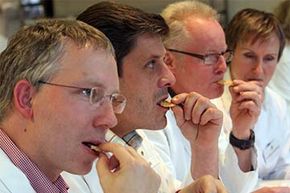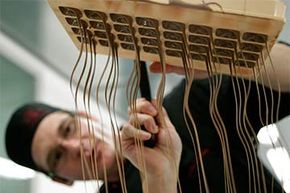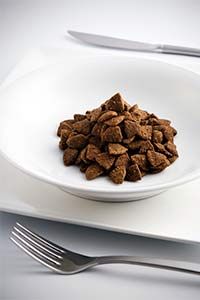How'd you like to eat chocolate for a living? Or curly fries? You could if you're a professional food taster. The job sounds so appealing: Eating your must-have food as much as you want! That's not quite how professional food tasting works, however. While tasters definitely evaluate how delectable a product is, they're also scrutinizing how it looks and smells, plus considering its consistency and innumerable other factors.
And contrary to what some believe, they're not making meals out of the foods they're tasting, either. Taste-testers take small bites of a particular food, which allows them to truly evaluate its various components. Then they spit it out and cleanse their palate in preparation for the next sample by sipping water or perhaps even gargling.
Advertisement
There are two basic types of food tasters: The first group consists of professionally educated and trained men and women who are often employed as food technicians, food scientists or product developers. The second type comprises consumers who work part-time or on an as-needed basis to taste-test products for companies. The former group samples food as one part of their job, while the latter group is only involved in taste-testing.
Ice cream producer Ben & Jerry's has professional tasters on staff, dubbed "flavor gurus" who create new ice cream flavors. Most of these gurus have backgrounds in food science or as chefs. Meanwhile, the Schwan Food Company, which is based in Marshall, Minnesota, and sells frozen foods through home delivery and grocery stores, invites people living near company headquarters to become paid taste-testers. They sample current and new products in its "sensory tasting laboratory" and provide feedback. All potential tasters have to do is fill out a form with basic demographic information and food preferences and they'll be notified when tests are available.
In between these two extremes are firms like MMR Research Worldwide that conduct consumer and sensory market research for companies in the food, drink and personal care sectors, including Dunkin' Donuts, Unilever, Barilla and Kellogg's. MMR hires "sensory panelists" to taste-test part time on a fixed schedule, first putting them through extensive training. No particular education or experience is needed for the job, but the MMR website says that "candidates should have good sensory acuity (this will be tested at a screening session), and have the ability to articulate themselves in front of others."
So what is sensory acuity, and how do you know if you have it? Find out on the next page.
Food taster FAQ
What is a professional taster?
What does a food taster do?
How do I become a food taster?
What education do you need to be a food taster?
How much do food tasters make?
How Can I Become a Food Taster?
As you can see, there are various ways to get into this field, and a degree in food science or tasting experience isn't always necessary. However, remember this: There are a lot of foods out there. While you may be dreaming of evaluating hamburgers or candy, you may be hired to taste items not quite so appealing, such as crackers, ketchup or fish oil. Still intrigued? Let's see how to best prepare for the job.
If you're interested in becoming a professional food taster, you'll most likely need a degree in food science or the culinary arts. A nutrition degree can also be helpful, as well as a post in product development at a food or beverage company. Working with the food you'd like to test is another avenue that may help you get into food tasting. A professional taster and innovations director for Godiva was a self-described chocolate lover with a psychology degree and an MBA. She was sent to "chocolate school" in Montreal to learn about the complexities of the confection in addition to her on-the-job training [source: Donaldson-Evans].
Advertisement
Professional food tasters say it helps to prepare your body as much as your mind for this job. Protect your 10,000 taste buds by passing on cigarettes, booze and super spicy or salty foods. Lay off the aftershave or cologne, as heavy scents can impair your sense of smell -- and 80 percent of taste is smell. Finally, eat your veggies. Peter Lind, a Ben & Jerry's food guru, says you can't continually evaluate a wealth of new foods accurately unless you're eating a very healthy diet. Not to mention that you'll have to exercise regularly if you want to avoid gaining weight. Having a lot of food allergies could be a detriment to this kind of career also, as you may have to sample many different types of food.
Whether you're going the professional route or that of a part-time amateur, you have to have sensory acuity. This means you can identify, for instance, the sugar, salt or acid levels in various products, and articulate this information to others. Some people just happen to have a knack for this, and that usually comes through on the tests they're given when they sign up to work as consumer taste testers. For instance, potential testers at MMR are first given taste and odor recognition tests, and asked to describe the attributes of various food items. (For instance, how would you describe mayonnaise to someone who did not know it?) Those who pass and are hired are then trained to objectively test and rate products [source: Maurer].
Companies that use consumers simply to give a thumbs-up or thumbs-down on a product, may just ask them to address basic questions like, "Is this egg roll too spicy?" or "Does this pizza have enough cheese?" At Schwan, the tester would taste the product over several bites and enter her answers on a touch-screen computer.
Food taster FAQ
What is a professional taster?
What does a food taster do?
How do I become a food taster?
What education do you need to be a food taster?
How much do food tasters make?
The Pros and Cons of Being a Food Taster
There are many pros to becoming a professional food taster. For starters, the salary's not so bad. While the Bureau of Labor Statistics doesn't have a category for "food taster," its May 2013 occupational employment and wages report said the mean annual wage for food scientists and technologists was $65,340, with some professionals earning more than $100,000 annually. That's not too shabby. And if you're tasting Ben & Jerry's ice cream or Godiva chocolates nearly every workday, that's an additional -- and delectable -- perk.
But the job has its less glamorous side, too, mainly for the nonprofessional tasters. Tasting can be quite monotonous, for one thing, as tasters often examine one type of product, such as onion rings or coffee, for weeks at a time. It also requires a lot of concentration. You're typically not eating a fistful of chips and saying yay or nay. You'll take a small nibble out of a cookie, for example, and have to evaluate everything ingredient by ingredient, aspect by aspect. How buttery is it? Can you taste the vanilla? How strong is the cinnamon? Did it crumble or melt in your mouth? Were the raisins too dry? You may then have to assign each ingredient or aspect a numeric ranking. Then you spit it out. If you're working as part of a group sensory panel, discussions and negotiations with your fellow panelists may also have to take place, which can sometimes become prolonged and heated if panelists disagree [source: Saelinger].
Advertisement
Sometimes there are side effects from taste-testing so many similar foods over and over, too. One consumer taster spent eight months on a panel for frozen fried foods, mainly sampling french fries. He reported coming home after tastings with huge blisters in his mouth from all of the salt. He added that many of his fellow panelists started having dental and health problems, so he decided to quit [source: Dang].
Finally, tasting can be an exhausting, stressful job, as it takes a lot of concentration for a proper evaluation. And your taste buds are easily fatigued. Tasters generally only work a few hours at a time, and some just an hour or so a few days a week. On the other hand, this type of schedule makes it a great part-time job for many. The pay for the non-professional might range from $12 to $16 per hour [source: Dang].
And in case you were wondering, people sample pet food, too.
Food taster FAQ
What is a professional taster?
What does a food taster do?
How do I become a food taster?
What education do you need to be a food taster?
How much do food tasters make?
Pet Food Tasters
You may think anyone who even considers taste-testing pet food is desperate, a bit wacky or both. But you'd be wrong. The job is actually typically a highly-skilled one, and more like a combination of researcher and taster. Generally someone with a doctoral degree, a pet food taster's main job is testing, not tasting -- evaluating a given pet food's nutritional value, writing reports and determining ways to enhance new pet foods currently being developed [source: Inside Jobs]. Still, at some point they have to get down to business: sampling it.
Before digging into a bowlful of pet food, the taster first critically appraises its smell. While many animals wolf down their food, appearing to pay no mind to smell or taste, its smell is actually one reason why they like it. Additionally, pet owners are picky about a given pet food's odor. Who wants their house to reek of fish or liver? After evaluating the smell, it's time for the pet food taster to nibble that kibble. As with all other food tasting, testers evaluate its flavor, texture and consistency, and then -- thankfully -- spit it out.
Advertisement
Is it really necessary to taste pet food? Yep. Pets can be just as selective about their food as we are. If a pet food taster thinks a particular food tastes awful, it's likely the pets would as well. The good news? A professional pet food tester-taster generally earns at least $34,000 per year, and can even rake in more than $100,000 annually. Makes the job a bit more, um, savory [source: Inside Jobs].
Food taster FAQ
What is a professional taster?
What does a food taster do?
How do I become a food taster?
What education do you need to be a food taster?
How much do food tasters make?
Food taster FAQ
What is a professional taster?
What does a food taster do?
How do I become a food taster?
What education do you need to be a food taster?
How much do food tasters make?
Lots More Information
Author's Note: How Food Tasters Work
I'd love it if a food scientist peered into my husband's mouth. I have a feeling he just may be a 'super taster' -- someone with two or three times the normal number of taste buds. He can discern nuances like oak and vanilla when wine-tasting, and can pick out coconut and lemon in any food, even if it contains just a hint. I thought I had defective taste buds before working on this article. Now I know he likely just has loads more than I do.
Related Articles
Sources
- Allen, Peter. "Paranoid Putin has every meal tested for poison by qualified food tasters, claims former chef." The Daily Mail. July 24, 2012. (Nov. 23, 2014) http://www.dailymail.co.uk/news/article-2178336/Vladimir-Putin-President-meal-tested-poison-qualified-food-tasters-claims-chef.html
- Amira, Dan. "Walter Scheib, Former White House Chef for Clinton and Bush, Defends Presidential Food Tasters." Daily Intelligencer. March 19, 2013. (Nov. 23, 2014) http://nymag.com/daily/intelligencer/2013/03/obama-food-taster-walter-scheib-president.html
- Ben & Jerry's. "Meet Our Flavor Gurus." (Nov. 25, 2014) http://www.benjerry.com/flavors/flavor-gurus
- Dang, Mike. "What It's Like to Work as a Professional Frozen Food Taster." The Billfold. March 25, 2014. (Nov. 23, 2014) http://thebillfold.com/2014/03/what-its-like-to-work-as-a-professional-frozen-food-taster/
- Donaldson-Evans, Catherine. "Professional Tasters Eat and Drink for a Living." Fox News. Jan. 13, 2004. (Nov. 23, 2014) http://www.foxnews.com/story/2004/01/13/professional-tasters-eat-and-drink-for-living/
- Howcast. "How to Be a Professional Food Taster." (Nov. 23, 2014) http://www.howcast.com/videos/432523-How-to-Be-a-Professional-Food-Taster
- Inside Jobs. "Pet Food Tester." (Nov. 23, 2014) http://www.insidejobs.com/careers/pet-food-tester
- Inside Jobs. "Professional Taster." (Nov. 23, 2014) http://www.insidejobs.com/careers/professional-taster
- Luthern, Ashley. "Testing for Poison Still a Profession for Some." Smithsonian. June 26, 2009. (Nov. 23, 2014) http://www.smithsonianmag.com/arts-culture/testing-for-poison-still-a-profession-for-some-61805292/?no-ist
- Maurer, Daniel. "So You Want to Be a Professional Food Taster." Grub Street. Jan. 6, 2011. (Nov. 23, 2014) http://www.grubstreet.com/2011/01/so_you_want_to_be_a_profession.html
- MMR Research. "Careers at MMR." (Nov. 25, 2014) http://www.mmr-research.com/careers
- My Majors. Food Taster Career. (Nov. 23, 2014) http://www.mymajors.com/career/food-taster/
- Nania, Rachel. "Role of a food taster outside the White House." WTOP. Sept. 22, 2014. (Nov. 23, 2014) http://www.wtop.com/41/3706519/Role-of-a-food-taster-outside-the-White-House-
- Saelinger, Tracy. "The truth about being a taste tester: It's not always tasty." Today. Feb.19, 2013. (Nov. 23, 2014) http://www.today.com/food/truth-about-being-taste-tester-its-not-always-tasty-1C8427211
- The Schwan Food Company. "Become a Taste Tester." (Nov. 24, 2014) http://www.schwanstastetesting.com/learnmore.htm
- United States Department of Labor. "Occupational Employment and Wages, May 2013: 19-1012 Food Scientists and Technologists." (Nov. 24, 2014) http://www.bls.gov/oes/current/oes191012.htm
Food taster FAQ
What is a professional taster?
What does a food taster do?
How do I become a food taster?
What education do you need to be a food taster?
How much do food tasters make?
Please copy/paste the following text to properly cite this HowStuffWorks.com article:





